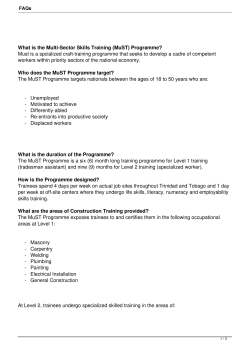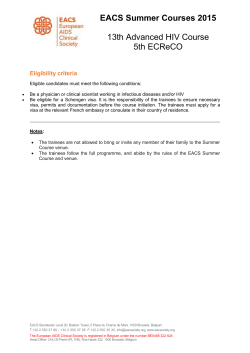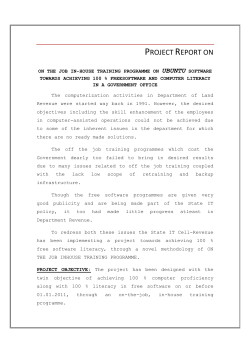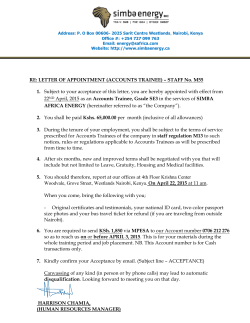
Mentor meeting summary draft 2 - ELTE
Mentor meeting at DELP Summary March 24th 2015 At the Faculty level mentor forum in Gólyavár, among other presenters, Révész Judit talked about the six concerns that teachers try to combine and harmonize when they make teaching decisions. Her presentation was based on Kennedy’s 2006 article entitled ‘Knowledge and Vision in Teaching’ (Journal of Teacher Education 57/3). In another short plenary talk, Major Éva raised the issue of trainees' needs and expectations during their teaching practice and presented the areas where trainees need mentoring support according to the results of two recent research projects. Following the plenary presentations, about 30 mentors and 7 university based English teacher trainers gathered at our meeting at DELP to discuss what university teacher education courses do and could do better to help trainees prepare for their teaching practice. Our second agenda point was to share good practices in mentoring. We spent two hours learning from each other through activities and discussions. Those who could stay on for another hour gathered for an informal discussion hosted by Uwe Pohl in Könyvtár Klub. What teacher education courses do to prepare trainees for their teaching practice A summary of Workshop One facilitated by Enyedi Ágnes and Lázár Ildikó Problems that bother most mentors (collected last year, see also last year’s summary): • lack of motivation to improve / reflect ⌘ • narrow-‐mindedness / stuck in old-‐school methodology ⌘ • lack of self-‐confidence / over-‐reliance on the mentor ⌘ • some personality issues (no respect for students, weak classroom presence) ⌘ • language proficiency ⌘ • not finding their professional self (wrong tone of voice, appearance, authority) • blaming others for lack of success (students, mentor, school) ⌘ Mentors now suggested that university courses could also help prepare trainees in the areas marked with a ⌘ above. Some solutions were offered by the groups last year as to how mentors can help: • use activities to familiarize trainees with school culture and build empathy • get trainees to initially write down instructions verbatim • allow trainees to conduct a lesson without the mentor being present • encourage trainees to ask pupils to give feedback on trainee’s work • get trainees involved in extra-‐curricular activities at the school • help trainees to manage stress and let off steam After this short introduction, we presented our methodology-‐related university courses in a four-‐corners activity. Groups of mentors visited some DELP tutors who presented their courses in the four corners of the meeting room, they showed course books and course descriptions and answered questions about what we teach and how we teach it in the courses listed below. For more information, or if you were not present, please consult the course tutors. Don’t hesitate to write to us and visit our courses. Our email addresses are listed on the DELP website: http://delp.elte.hu Methodology-‐related courses 1 Courses that were presented in the four corners: Methodology 1 and 2, a course of 4 hours per week, two semesters (taught by Enyedi, Lázár, Major, Medgyes, Szesztay, Szabó, Veljanovszki on a rotating basis) One semester, 2 hours per week courses: Classroom observation (usually taught by Enyedi, Révész, Ryan) Language development for teachers (usually taught by Halápi, Medgyes, Ryan, Szesztay) Language pedagogy option courses: Insights from CEFR (Dávid), Dyslexic learners (Enyedi), English matura exam (Halápi), EFL for Intercultural Competence (Lázár), ICT in ELT (Major), EFL for Young Learners, Drama in EFL (Révész). Feedback coming from the mentors visiting some of the corners: ü We (methodology instructors) were reinforced in our efforts to practice grammar presentations with the trainees because it still seems to be a very difficult area for them. ü During micro-‐teaching (peer-‐teaching) sessions we should encourage our trainees to use coursebooks as much as possible and base their teaching on them. ü Mentors appreciate the effort we are putting into helping trainees improve their language competence, oral and written language use in the classroom and professional environments. ü The evergreen: there are still trainees whose language competence is embarrassingly low despite passing the proficiency exam; mentors suggest that trainees who have barely passed the exam get a warning that their language level might not be good enough for competent classroom work and that they should take care of their own further development. ü It seems that although we do prepare trainees that their task is to observe and interpret but not to judge, when our students observe a lesson in a school they tend to say "it was very good, thank you" but shy away from asking questions or getting into a discussion. Apart from losing an important opportunity to develop, it is also embarrassing for the teacher who would like to know what the students were observing or what they saw. So good questions and constructive comments would be welcome after a lesson observation. Good practices in mentoring based on feedback from trainees A summary of Workshop Two facilitated by Szabó Éva and Szesztay Margit The workshop focused on good mentoring from the trainees' perspective. Mentors responded to our trainees' feedback on what they found the most helpful during their teaching practice and shared how they organize feedback sessions and work in general with trainees. Many of the quotations that we had collected from trainees and discussed at the meeting are inserted below the photos. What trainees find helpful and useful during their teaching practice (extracts from feedback): I liked the teacher community of the school, and the fact that it was a relatively small secondary school, so I was able to have a closer relationship with some teachers/be part of such a community. It was a warm, welcoming, helpful environment for a trainee. 2 My mentor always expressed her opinion honestly, but nicely about my lessons. That helped me to also talk to her honestly about my difficulties and problems relating to teaching. She was quite flexible and empathized with my (and with the students') situation, too. She has seen becoming a teacher a gradual process,, and did not expect everything to be perfect for the first time, which was a soothing idea. The best part of the teaching practice was being able to try out in "real life" all the techniques and methods that I had learnt about in class, and seeing whether they worked. My mentor's support was the most important for me. She was the one to provide me with another point of view, she was kind of an outsider on my lessons, and saw more than I did. This way I could evaluate my lessons based on not just how I felt and what I saw, but also on the opinion she shared with me. So even if I thought my lesson was a disaster, she was there to pick me up and tell me what REALLY happened. I relied on this support so much that I didn't even want to go in class without her, because I wanted her to see everything and tell me after the lesson that it hadn't been as bad as I thought. :) She always pointed out possible difficulties in advance. She always had enough time to discuss my lesson plans and ideas in detail and she also gave an emotional support. She had very high expectations but she helped me to live up to them. Most useful: During my lessons she writes detailed and very helpful comments on what I or the students do on a colourful piece of paper. She never says that I did something wrong; she only says that this or that could be improved. She also has useful comments about my lesson plans. She has great ideas and she also appreciates my ideas. She had also let me do warmers before I started teaching. I was very lucky, because almost all of my mentors were doing what I imagine a mentor should do: helps you if you need it but lets you explore certain areas on your own. They shared some golden "secrets" with me and taught me things about the dynamics of the school (which is not really a topic at the university..) and how to see the big picture, not just one lesson at a time (which I also missed from our studies). 1. A mentorom nagyon komolyan vette az óramegbeszélést, amennyire lehetett, a bűvös 24 órás határt is betartottuk, vagyis igyekeztünk még aznap megbeszélni az órámat. Ez azért volt jó, mert friss volt az emlék, és az első reakciókat is sikerült értelmezni. 2. Elérhető volt facebookon (vagyis elektronikus úton), illetve azt is rögtön láttam, ha valamit elolvasott. Mindig ügyelt rá, hogy tudjam a határidőket, és ha én várhattam tőle valamit, akkor ő is szabott "magának" egyet ("délután nem leszek gépközelben, de este kilenc körül meg tudom nézni, amit írtál"). 3. Az óramegbeszélésekkor mindig először nekem kellett reflektálni, és SOHA NEM SZAKÍTOTT FÉLBE. Ez nekem azért volt nagyon fontos, mert ekkor tanultam meg, hogy egy óra után nem rögtön más leszúrását kell várnom, hanem nagyon sok hibámra vagy épp pozitív dologra magam jöhetek rá. Erre szerintem nagy szükségem van most, hogy ha be is jönnek az órámra, nem mindig van rá lehetőség, és önállóan kell értékelnem sok tanórát. 4. Mintát nyújtott, akár dolgozatpéldában, akár értékelési magatartásban, de nem várta el, hogy pontosan azonosouljak ezzel, mindaddig, amíg meg tudtam indokolni, mit miért teszek. 5. Kezdetben ijesztőnek tartottam, vagyis nem feltétlenül a pozitív oldalra került, hogy eléggé önállósodásra szoktatott, vagyis nagyon kevés dologban mondta azt, hogy "ezt így csináld". Ez kezdetben nagyon zavart, mivel nekem szükségem van arra, hogy valaki kijelölje, mit hogyan tegyek. Mostanra azt gondolom, nagyon hasznos volt az önállósodásomban. 6. Sokszor éreztem azt, hogy sokkal nagyobb tudása és rutinja van nálam, mégsem kezelt soha kis senkinként. Példaként tekinthettem rá. 7. Ha hibáztam, általában iszonyúan felfújtam, világvége volt. Ő mindig arra vezetett rá, hogy "jó, ezt hagyjuk, mit lehet ebből kihozni, merre lehet rajta javítani?" A tanításban ez a jó. :) Az első mentorom mielőtt teljesen a mélyvízibe dobott volna megengedte hogy pár órán először csak egy-‐
két foglalkozás erejéig ugorjak be. Nekem ez nagyon jó volt, mert így lehetőségem volt hogy lépésről lépésre kezdjek el tanítani nem rögtön egy egész órát megtartani. Mire odajutottam hogy élesben ment a gyakorlatom már ismertem a gyerekeket, tudtam a nevüket ami mind sokkal gördülékenyebbé tette a gyakorlatot. 3 Amit nagyon fontosnak tartok még, hogy egy mentor legyen mindenképpen támogató, türelmes és segítőkész. Sajnos azt vettem észre hogy nagyon sok mentor nem nagyon ért a munkájához, nincs tisztában vele mekkora a felelőssége, nem veszi komolyan és a saját módszerét és elképzeléseit próbálja rákényszeríteni a gyakornokra. Nagyon kevésszer van lehetőségünk kipróbálni az egyetemen tanultakat ugyanis a mentorok és az ott dolgozó tanárok egyáltalán nem nyitottak az új teaching methodokra. Véleményem szerint a nyitottság kulcsfontosságú. -‐ nem csak a tanításban segített a mentorom, hanem bekapcsolódni az iskola életébe és a kollegák közé is -‐ minden órán ott volt (kivéve, ha kértem, hogy ne) -‐ jegyzetelt, mindig megbeszéltük utána/ a szokásos lyukasórában, sok időt szántunk rá -‐ látta, hogy hajlamos vagyok a rosszul sikerült dolgokon leragadni, segített ezt tudatosítani és észrevenni a jókat -‐ segített hosszabb távlatokban látni, hogy mi lehet egy egy jelenség oka/kövezkezménye, amit tapasztalat híján nehezen értelmeztem -‐ megosztott konkrét activity tippeket és feladatforrásokat is -‐ segített az adminisztráció rejtelmeit kinyomozni (óraelszámolás, hospitálós papír) -‐ őszinte volt és lelkiismeretes My mentor did not want to tell me exactly what to do in the lessons, but she rather gave me guidance how to realise my ideas, which I found really useful. Also, she helped me become more confident and effective in giving feedback and evaluating students. The best thing in my teaching practice was that I could put the theory I studied at the university into practice. I taught students who weren't really interested in English, so the teaching was not always rewarding; however, I became more self-‐confident in the classroom because of this experience. My mentor always supported me, I could turn to her if I had problems or doubts. After the lessons, we discussed my teaching in detail. If I did something wrong, she never criticized me in an offending way, but asked questions such as "How can you improve that?" or "How would you do that next time". She gave me advice on how I could improve my teaching. She noticed my development and praised me when I managed to make progress in an area where I had difficulties. My mentors inspire me: even after a hundred years of teaching, they constantly think about how teaching can be improved. “Stammtisch” informal discussion in the café after the meeting THANK YOU FOR COMING AND SEE YOU ALL AGAIN AT OUR NEXT MENTOR MEETING! 4
© Copyright 2025










